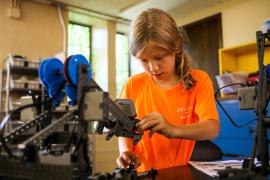Finally the campers are quiet and the flashlights are stowed under the benches. The dark stillness is broken by the chirp of crickets, honking frogs in the nearby pond, and the single call of an owl. Overhead, stars sparkle framed by the boughs of the lofty pines. Then out of the shadows in the middle of the circle a light flares and brings flames to the center of the campfire. Slowly the dimness brightens. Shapes on the benches become silhouetted against the night woods and then out of the broadening light emerge the faces of campers. A community comes into view. And soon the stillness is rent by the songs and stories of that place.
This is a scene that is repeated again and again at all kinds of camps—religious, agency, and private—each summer. It is this image of the campfire that gives us a doorway into an exploration of spirituality. It can lead us to a meaningful understanding of spirituality that can function for both religiously-affiliated and nonreligious camps. Such an understanding will need to be broad enough to be helpful to nonreligious camps and specific enough to enrich the programs of religiously-affiliated camps. Using the image of the campfire experience as a starting place, we can explore spirituality—and its role at camp.
Those of us who have sat around those fires remember the darkness, our fear of the night's unknown, the magical release that comes with being able to see the faces of our friends across the fire, and the comfort of familiar songs and stories. In that place and time we each know ourselves as part of something bigger than we are; we know ourselves as part of the vast unknowable creation and as part of that community gathered around the fire.
Being spiritual is woven into our human nature. As humans we have the ability to be self-transcendent—to experience the mystery of something beyond ourselves. Spirituality is intrinsic to the human creature. It is part of each and every one of us whether we choose to nurture it or to even be attentive to it.
Spirituality is that part of humanity that enables us to reach beyond ourselves—to reach outside ourselves and to know there is something greater than we are—regardless of what we call that power—or even our choice to ignore or deny it. Spirituality stretches out beyond the boundaries of religion, culture, history, and social context. For those around the campfire, the experience holds the possibility of connecting with the greater forces of the universe and with those who sit with us in the light of that fire.
Spirituality and Religion
Think for a moment about your own reaction when you hear or read the word "spirituality." What did you think when you saw the title of this article? Did you immediately assume that it was addressed primarily to religiously-affiliated camps? Did you assume that it was somehow related to a religious discussion? Your answers are reflective of one of the misconceptions about spirituality—that it is the same as religion.
Frequently, religion and spirituality are lumped under a single heading and thought not to apply to those camps who choose not to espouse any particular religion. Religion and spirituality are not the same. In any attempt to understand spirituality, the interconnection between religion and spirituality must be untangled in such a way that both are clearly defined and their scope identified.
Religion can be characterized as a well-developed system of thought, as a code of ethics, and as a point of reference by which persons relate to others who believe as they do and to the universe. This system of beliefs gives answers to the questions of meaning of life and identity. These answers claim to fit all human conditions and circumstances. The focus is on an interaction with a higher being and on the benefits of faith in that being. It is the purpose of the religious practice to translate the "absolute" truth of faith into specific needs and settings (Hay, Reich, and Utsch, 2006).
On the other hand, spirituality is understood as the intrinsic capacity of the human for self-transcendence and recognizes that each human is rooted in something larger than just the self—perhaps even in the holy. Spiritual development has been called the "engine" that compels the self toward purposefulness, connection, contribution, and meaning. The nurture of the spiritual development leads toward integration of the self, an inner peace, and a desire to reach out in service to others (Hay, Reich, and Utsch, 2006).
Understanding the distinctiveness and scope of religion and spirituality is much more complex than these two paragraphs would make it seem. Much has been written and is being written on this complicated relationship. However, for our purposes as camp folks, the importance of this discussion is the awareness that each of us—camp leaders and campers—are spiritual beings. This consciousness leads us toward a deeper understanding of our responsibility to intentionally nurture the spirituality of all who come to our camps.
Recent Attention to Spiritual Development of Children and Youth
Fortunately, some up-to-date research and some recent innovative attention to the issue of spiritual development in children and adults are available to help us in the endeavor. We are not left alone to figure it out. As emerging results of research become available, we will be hearing more and more about the connection between camps and spiritual development.
In the Youth Development Outcomes study conducted by the American Camp Association (ACA) between 2001 and 2003—made available to camps as the Directions report in 2004—spirituality was one of ten "constructs" measured in the research. The results "suggested a statistically significant increase in spirituality from pre-camp to post camp" (Directions, p.15). When counselors were asked to report on frequency of doing helpful acts, following rules and playing fair, making decisions, and demonstrating spirituality, the results suggested a significant growth in these values.
The Search Institute, long known for its commitment to developing healthy children, youth, and communities, has recently launched the Center for Spiritual Development in Children and Youth (www.spiritualdevelopmentcenter.org). The focus of the Center is on the ways children and youth develop spiritually. They are committed to the improvement of research, partnerships, and practical resources to aid the work of all those who work with children and youth. ACA will be a partner with the Search Institute in this work.
As the leaders of the Center began to explore the scholarly work and research available in both religious and the spiritual development of children and youth, they discovered several trends. First, there is no cohesive and integrated stream to the study of spirituality in children and youth. While the issue is being studied, the research appears within a wide diversity of disciplines, and there is little effort to gather the streams together. This results in a variety of definitions and theories, differences in methods of measurement, and a void in attention to the cultural context of the study (Roehlkepartain 2005).
A further complication is that the behavioral sciences have marginalized the study of spirituality. Scholars in these fields in their failure to differentiate between spirituality and religion have viewed the former as a "discretionary" activity in the same category as sports and art. They do not understand spirituality as basic to human nature and thus an appropriate area of study and focus (Benson 2006).
Recent research and theological study regarding children and youth have focused on "religiosity" and not spirituality. Deepening any knowledge bank on spirituality thus requires separating the data about spirituality from the research on religion (Roehlkepartain 2005). This effort is additionally complicated by the lack of scholarly attention within religious studies to the area of spirituality.
Finally, there has been little attempt to understand the spiritual development of children and youth. For a long time, those working in the fields of education and religious studies have taken it for granted that children and youth develop spiritually in the same way adults do. This has resulted in practices that attempt to build a foundation for child and youth spirituality using the same techniques that are used with adults. They have not recognized or valued the unique manner of spiritual expression found in childhood and adolescence (Yust, Johnson, Sasso, and Roehlkepartain, 2006).
Connections Between Research and Camps
One of the first efforts of the Center was to pull together the vast amount of scholarly work and research that is addressing the issue of spiritual development in children and youth. One hundred scholars were invited to examine spiritual development of children and youth from the perspectives of theological/religious community and social sciences. The resulting volumes—Nurturing Child and Adolescent Spirituality and The Handbook of Spiritual Development in Childhood and Adolescence—reflect the insights of scholars in different disciplines and have increased the ease of access to the current base of knowledge about spirituality.
The editors of the Nurturing Child and Adolescent Spirituality developed a working definition of spirituality to guide the work of the volume's writers (Johnson, Sasso, Roehlkepartain, and Yust, 2006). In examining the list of characteristics of spirituality they identified, it is easy to see the connections between these insights and what is valued at camps.
Spirituality is part of the human creature.
Camps are places the spiritual nature of campers is already recognized. It is at camp that campers are invited and encouraged to use creativity and imagination, to dream dreams, to wonder, to ask hard questions, and to reach for the best in themselves.
Spirituality is firmly planted in relationships and within community experiences.
Camps are by their very nature a place where relationships are nurtured and nourished. A sense of community is built which draws campers back year after year to reestablish relationships and to recapture that sense of belonging. An important emphasis of ACA's Program Improvement Process (PIP) is the examination of the ways camps can better organize to provide supportive relationships for campers within the camp community.
Spirituality is expressed in ethical behavior.
Camps are committed to creating an environment for ethical behavior that is based on a sense of responsibility to others within the camp community and beyond that community. Camps are often places where behaviorial expectations are stated clearly and in which campers are invite to share in the creation of some of the expectations.
Spirituality leads to growth and change.
Camp is a place where children and youth grow and change. Isn't that what we camp leaders seek to do in multiple ways? We want kids to grow in positive self-image, in confidence, in activity skills, in a sense of independence, in their ability to make friendships, and leadership abilities.
Spirituality needs to be nurtured in an intentional manner.
Camps are places that can practice intentionality about everything they do. A major discovery in the Youth Development Outcomes of the Camp Experience, a study conducted by the American Camp Association and Philliber Research Associates, was that the camps that are most successful in reaching their goals are those camps who have a clear mission statement and who design program that enables them reach those goals in an intentional manner.
And all this brings us back to the campfire circle, to the mystery of quiet darkness and the single spark, to the growing sense of belonging as the light spreads to make faces clear. Around the fire sit all of us—spiritual creatures—longing for purpose, meaning, and connection. Camps have always responded to this longing. As our consciousness as camp leaders is raised about the connection between camps and the spiritual development of children and youth, we can be more and more intentional about this important task.
|
Additional Resources for Religiously-Affiliated Camps Real Kids, Real Faith by Karen MarieYust (Jossey-Bass, 2004) Soul Searching—The Religious and Spiritual Lives of American Teenagers Final Report of the Indiana Camp Ministries Enhancement Program (ICMEP) |
|
Practices That Invite the Development of Spirituality Any camp—religiously affiliated or not—can promote the spiritual capacity of children and youth through practices,
|
References
- Center for Spiritual Development of Children and Youth, "Building a Field of Child and Adolescent Spiritual Development," interview with Peter Benson, www.spiritualdevelopmentcenter.org (accessed 2006).
- Roehlkepartain, Eugene C. "Reflections on the State of the Field of Spiritual Development in Childhood and Adolescence," Center for Spiritual Development of Children and Youth, www.spiritualdevelopmentcenter.org (accessed August 2005).
- Hay, D.; Reich, H.; and Utsch, M. (2006). "Spiritual Development: Intersections and Divergence with Religious Development," The handbook of spiritual development in childhood and adolescence. Thousand Oaks, CA: Sage, pp.46-59.
- Yust, K.M.; Johnson, A.N.; Sasso, S.E.; and Roehlkepartain, E.C. (2006). "Traditional Wisdom: Creating Space for Religious Reflection on Child and Adolescent Spirituality," Nurturing child and adolescent spirituality: Perspectives from the world's religious traditions. Lanham, MD: Rowman & Littlefield, pp. 1-13.
Nancy Ferguson M.Div., M.A., Ed.S., lives in Richmond, Virginia, where she is a church camp consultant and freelance writer. She directs the day camp program at Camp Hanover, is the management consultant for the Religiously Affiliated Camp Council (RAC) of the American Camp Association, and co-author of The Retreat Leaders Manual (Discipleship Resource, 2006). She can be reached at nanfergi@aol.com, www.BlueTreeResources.org.
Originally published in the 2007 March/April issue of Camping Magazine.




